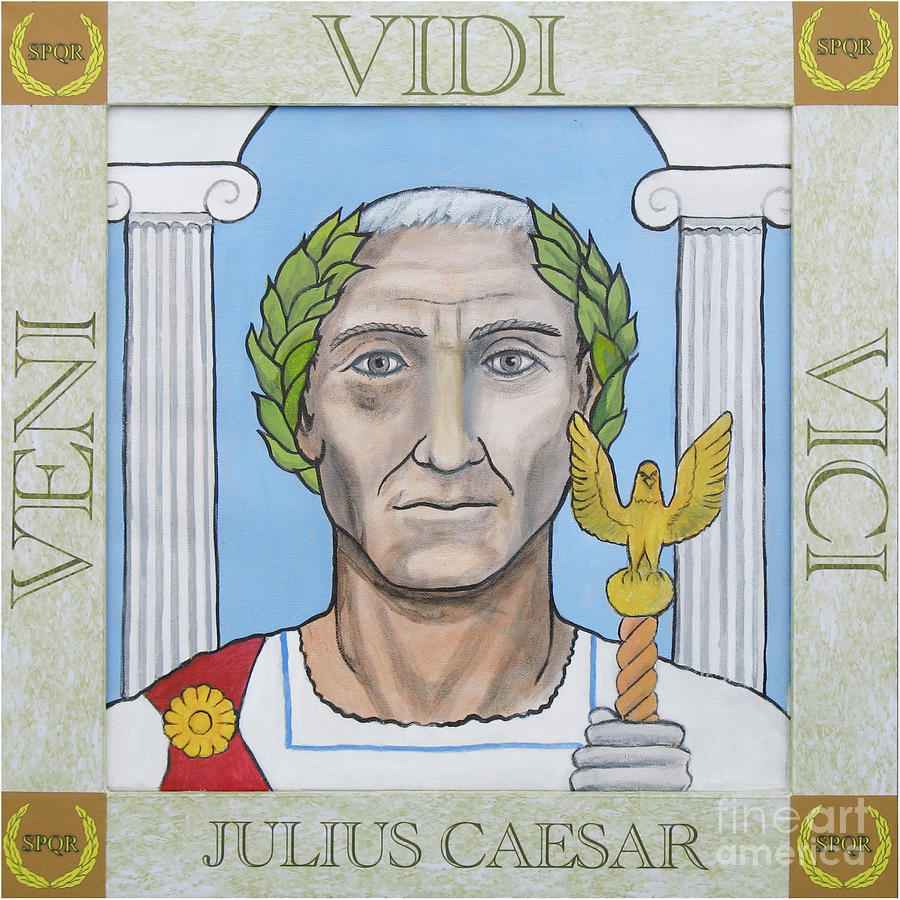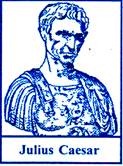The name of Julius Caesar is struck in golden letters as a world conqueror.
He appeared as a sun in the horizon of Rome and became famous in the annals of world history due to his crowning personality. From politics to history he left his mark in every field.
Till death, he became the hero of many romantic episodes. His devotion to work crowned him with success in each and every step.
Early Career:
ADVERTISEMENTS:
In 100 B.C. Julius Caesar was born in a Patrician family of Julii of Rome who claimed his descent from Venus. He was the proud son of father Gains Caesar and mother Aurelia. When Gaius was a Praetor, he appointed Marcus Antonius Ghipho, a man of Gaul as the teacher for Julius. Ghipho was a person of remarkable memory having proficiency in Greek and Latin language who influenced the thought and outlook of Julius. When Julius was learning, his father breathed his last.
In the meanwhile, Julius married Cornelia, the daughter of Sinna, a disciple of the revolutionary hero, Marius. As a young man, he had established his mark by refusing to divorce his wife at the behest of Sulla, the famous military dictator of Rome. With great difficulties, Julius could escape the clutches of Sulla by fleeing from Rome to Italy.
After Sulla’s death in 78 B.C., he returned to Rome and rose to political prominence. After that, Aurelia took Caesar to the island of Rhodes and left him under the guidance of Apolonius Molon, a Greek teacher who taught oratory to Julius. From him Ceaser also learnt ability to do hard work, sincerity, patience and political acumen.
ADVERTISEMENTS:
Returning back to Rome Julius took part in politics. He was elected as Quester in 69 B.C. After that, he never looked back. He was appointed in different posts like Tribune, Aiedil, and Praetor etc. and satisfied the people of Rome in various ways. In 59 B.C. Caesar was appointed as Consul.
On 59 B.C. he formed the Triumvirate with Pompey and Crassus. He now married Julia, the daughter of Pompey. Pompey was a great warrior and Crassus, an unscrulpulsous merchant. The Triumvirate wanted to control the administration of Rome. Rome was divided into three parts.
Julius Caesar ruled over the western part of Rome whereas Crassus over the eastern part and Pompey over the Southern part. Of course, Caesar desired to accumulate all powers in his own hand. The death of Julia led Caesar to marry Calpurnia whose father became a Consul.
Expeditions of Julius Caesar:
The marriage of Julius Caesar with Calpurnia gave him a political boost. His desire to be a great conqueror was fulfilled when he led several expeditions at different parts of the globe.
Gaul Expedition:
ADVERTISEMENTS:
As per the decision of the Triumvirate, Pompey remained in Rome. Crassus started his journey to conquer Parthia. Julius Caesar, with an army of 40,000 Roman soldiers, led an expedition to Gaul. By that time Gaul consisted of the present France, Neatherland, Switzerland, Germany and a portion of British Isles.
With bravery Caesar defeated the people of Gaul in different phases. From the Commentaries, written by Julius Caesar, information is gathered regarding his Gaul expedition. Julius Caesar stayed for long nine year there to conquer Gaul. At last he succeeded in conquering Gaul and making it a part of the Roman Empire.
By this conquest, the Roman Empire extended Utpo River Rhine in the North and Atlantic Ocean in the West. The soldiers who accompanied Caesar in the Gaul expedition sang his glory and bravery. Caesar brought development in agriculture there in Gaul and for that work he was liked by the native people.
Invasion of Germany:
After the conquest of Gaul, Caesar became jubilant. The bandits of Germany had obstructed the way of Caesar during his Gaul expedition. In order to teach them a lesson, Caesar marched towards Germany with his Roman army. A violent war took place between the army of Germany and Rome. At last, the German soldiers were defeated.
Caesar returned from Germany. After that, the people of Germany became rebellious. Caesar marched towards Germany with fury and inflicted a crushing defeat upon them. He drove them away completely to the other side of river Rhine.
Invasion of England:
In 54 B.C. Caesar invaded England. It was only because Prince Cassivellaunus of England harassed the Romans who lived there in Gaul. So Caesarea crossed the British Channel by ships and landed on the river bank of Thames. He defeated the army of England. The prestige of England was shattered. This victory of Caesar made him popular before his soldiers.
Civil War:
Crassus died in 53 B.C. while fighting against the Parthians. After the death of Julia, relation between Pompey and Caesar was strained. Thus, the triumvirate came to an end. Caesar now wanted to return Rome.
By the recommendation of the Senates, Pompey instructed Caesar to divide his army and send one after another to Rome. He had to reach Rome later on. Caesar defied this order. With his grand army he crossed a small river Rubicon in 49 B.C. This crossing of Rubicon is a great event in history because this made Caesar a dictator. Pompey was determined to face Caesar.
However, Caeser’s arrival frightened Pompey who fled away in 48 B.C. Caesar defeated Pompey in the battle of Pharsalus. Pompey fled away from the battle field towards Egypt. He killed the Senators who were the followers of Pompey. He also pardoned some of his followers among whom two were famous. They were Capsius and Brutus who later on murdered Julius Caesar. After the battle of Pharsalus, Caesar returned Rome. He was welcomed by people and made dictator for a period of ten years.
Campaign in Egypt:
After winning the confidence of the people, Caesar was in hot pursuit of Pompey desiring to meet him in person. With his arrival in Egypt, he was presented with the head of Pompey by a Greek. Caesar became cheerful and arrived in Alexandria in 48 B.C. He subdued a rebellious army in Egypt and substituted it by a Roman garrison.
He put Cleopatra and his brother Ptolemy on the throne of Egypt. He spent nine months there with the Egyptian Queen Cleopatra with romance. The romance ended with the birth of a son to Cleopatra named Caesarian. For this activity, Caesar had been criticized in future.
Campaign in Asia:
Caesar marched from Egypt towards Asia Minor. He defeated Pharnaces in 47 B.C. in the battle of Zela. Pharnaces fled away from the battle field. Caesar was delighted with joy and sent his message to one of his friends at Rome. That message was “Vini, Vidi, Vici”. (I came, I saw, I conquered). The Romans danced with joy with the achievements of Julius Caesar. This enhanced the glory of Caesar in Rome.
Campaign in Africa:
Caesar came to know that the followers of Pompey had taken refuge in North Africa. Caesar reached there in 46 B.C. He crushed them in the battle field of Thapsus. 50,000 soldiers were killed which included their readers like Juba and Scipio.
Cato, an old Senator killed himself before he fell in the hands of Caesar’s army. Then Caesar returned Rome to celebrate his victory.
Campaign in Spain:
Julius came to know that another group of Pompey’s supporters were hiding themselves in Spain. By that time, the supporters of Pompey had placed his son on the throne of Spain. Caesar defeated the enemy in the battle of Munda in 45 B.C. Even, he did not hesitate to kill the son of Pompey. This sanguinary battle brought an end to the career of conquest what Caesar was pursuing for a long time.
Caesar as a Reformer:
Caesar returned Rome with Cleopatra in October, 45 B.C. and saw the prevailing disorder in Italy. The entire administrative set up was ruined. The people of Rome appointed Caesar as ‘Dictator’ for life. In a grand function, the crown of the Roman ‘King’ was put upon his head by Mark Antony which he refused.
After that Caesar wanted to bring political stability in Rome. He accepted the title of ‘Imperator’. He treated the Senate as an advisory council and reduced it to a secondary position. Of course he raised the number of Questor and Praetor upto 40 who became his supporters. He nominated the persons and that was known as Commendation.
Thus, Caesar became a virtual dictator of Rome. He circulated gold coins at Carthage and Corinth and other centres in the different provinces. He prohibited high rates of interest and amended the law of bankruptcy. He took up massive constructive activities and solved the problem of unemployment by engaging the youths in the programme.
He also built many dykes to control the flood in river Tiber. He passed a famous law known as Lex Julia Muncipalis to regulate and organise the town community in Italy and the provinces. By all these reforms, he earned a great name.
Julian calendar:
Julius Caesar was a great mathematician. He opined that there was no relation of the calendar to the change of season. He appointed Sosignes, a Greek mathematician to devise a calendar on the Egyptian model. This Calender was known as ‘Julian Calendar’ after the name of Julius Caesar.
According to this new Calendar, a year consisted of 365 days with an extra day in every fourth February (leap year). The Calendar came into force from 1st January of 45 B.C. As per the name of Caesar, the name of one month in the Calendar was July. Right from that time, the world has accepted this Calendar.
Caesar as a Writer:
Julius Caesar was a writer per excellence. He wrote a book named the ‘Commentaries’. From that book, information is gathered regarding the wars and campaigns of Julius Ceasar. He also wrote many books in Latin language which also reflect about his wars and politics. He was also the founder of the first newspaper of the world known as ‘Acta Urbis’. Caesar’s works had their literary value.
Death of Caesar:
The nobles of Rome could not tolerate the fame of Caesar. He did not pay respect to Praetors, Questors and other administrators. He ordered to erect his statute in Rome, next to the Roman kings. He ordered to worship his image which was installed in the temple of Quirnis.
At Ephesus he struck a royal proclamation in which he declared himself as the saviour of mankind. His relation with Cleopatra was also not liked by the Roman people. The Roman nobles hatched a plot against him. They spread rumour that the illegitimate child born from Cleopatra will be declared as king by Caesar.
On 15 June of 44 B.C., the wife of Caesar denied him to go to the Senate. He did not care it and reached the Senate hall. He sat on the throne. Then twenty three conspirators surrounded him as if to do him honour. Casca, one of the conspirators stabbed him at the back. Caesar saw his trusted friend Brutes among them and was astonished. He uttered, “Et tu Brute” or “You, too Brutus’. The conspirators stabbed him brutally and he feels dead on the floor of the senate hall.
The life of Julius Caesar was romantic. He excelled as a warrior, administrator, politician, writer and a reformer. For his achievements, he has left an indelible mark in the annals of history.


